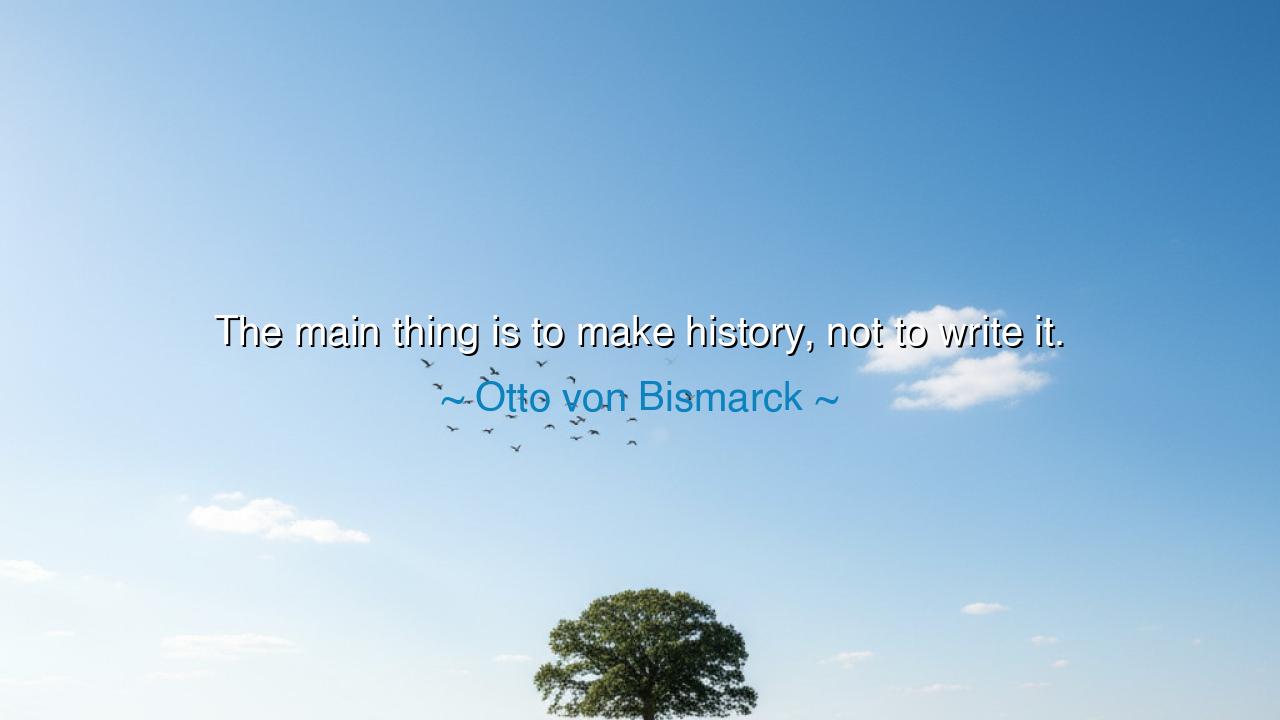
The main thing is to make history, not to write it.






The iron statesman Otto von Bismarck, architect of a united Germany and master of realpolitik, once proclaimed: “The main thing is to make history, not to write it.” In this simple but thunderous declaration, he gave voice to the eternal difference between those who merely observe the tides of time and those who shape them. His words are the cry of a man who lived not in the quiet study, but in the storm of destiny — one who believed that history is not a tale to be recorded by the timid, but a realm to be conquered by the bold.
The origin of this quote lies in the heart of 19th-century Europe, an age of kings and revolutions, of rising nations and crumbling empires. Bismarck, the “Iron Chancellor,” stood at the crossroads of that age. He did not inherit unity or greatness — he forged it. With cunning diplomacy and the iron will of a warrior-statesman, he brought together the scattered German states into one mighty empire under Prussian rule. He did not wait for historians to record noble deeds; he created them. To him, the pen was worthy, but the sword of decision — the courage to act — was divine. Thus he declared that the true greatness of a man lies not in the commentary of history, but in the making of it.
What, then, does it mean to make history? It is not simply to perform grand acts of war or politics, but to move the world — to bend events toward one’s vision. The historian may record the fall of walls, but it is the builder who raises them; the historian may write of revolutions, but it is the thinker, the leader, and the dreamer who kindle them. Bismarck understood that to shape history is to accept the weight of destiny, to risk failure and condemnation, to act when others merely debate. Those who make history do not wait for perfect moments — they create them through strength of will.
Consider Julius Caesar, who crossed the Rubicon and in doing so forever altered the fate of Rome. His act was not cautious, not calculated for the approval of chroniclers. It was defiance — an act of creation, of power. His enemies wrote of him as a tyrant, but the world remembers him as a maker of empires. So too with Bismarck, whose wars were not waged for conquest but for unity. He was not content to let philosophers debate the idea of a German nation; he brought it into being through diplomacy, steel, and sacrifice. Thus he joined the ranks of those rare souls who live not merely within history’s pages, but write their names upon its spine through action.
And yet, his words also carry a deeper wisdom — a warning to those who dwell too long in the comfort of reflection. The world, Bismarck reminds us, does not move forward through talk alone. The dreamer who does not act remains a ghost; the thinker who never dares remains unheard. To make history requires the fusion of vision and resolve, of intellect and courage. The writer records what is; the doer brings forth what could be. It is a call not only to leaders and warriors, but to every man and woman who wishes to leave behind more than dust: act, while others hesitate; build, while others comment.
Yet there is also a paradox here. For without the writers, the deeds of the makers would fade into silence. The chronicler preserves what the hero creates. But it is the hero — the maker — who gives them purpose. Bismarck’s quote reminds us that history is born in motion, in decisive acts, not in contemplation alone. The ink of the historian dries upon the blood, sweat, and faith of those who dared to step into the storm. Every writer owes his story to those who made it possible through struggle; every thinker stands upon the bones of the doers who came before.
So, my friends, let this truth settle into your hearts: to live greatly is to make history, not merely to read it. Do not wait for perfect times or certain victories. History belongs to those who act — to those who, even in fear, take a step forward. Whether in the quiet work of your calling, the defense of justice, or the creation of something that will outlast you, choose to be a maker, not merely a recorder. For when time has passed and the pages of history are written, it is not the watchers who are remembered, but the makers — those who dared to shape the world rather than observe its turning.
And so, as Bismarck himself might have said: write your story not with ink, but with action. Let your courage be your pen, your deeds your pages, your legacy the light that guides those who come after. For the main thing — the only thing that endures — is not to write history, but to make it.






AAdministratorAdministrator
Welcome, honored guests. Please leave a comment, we will respond soon